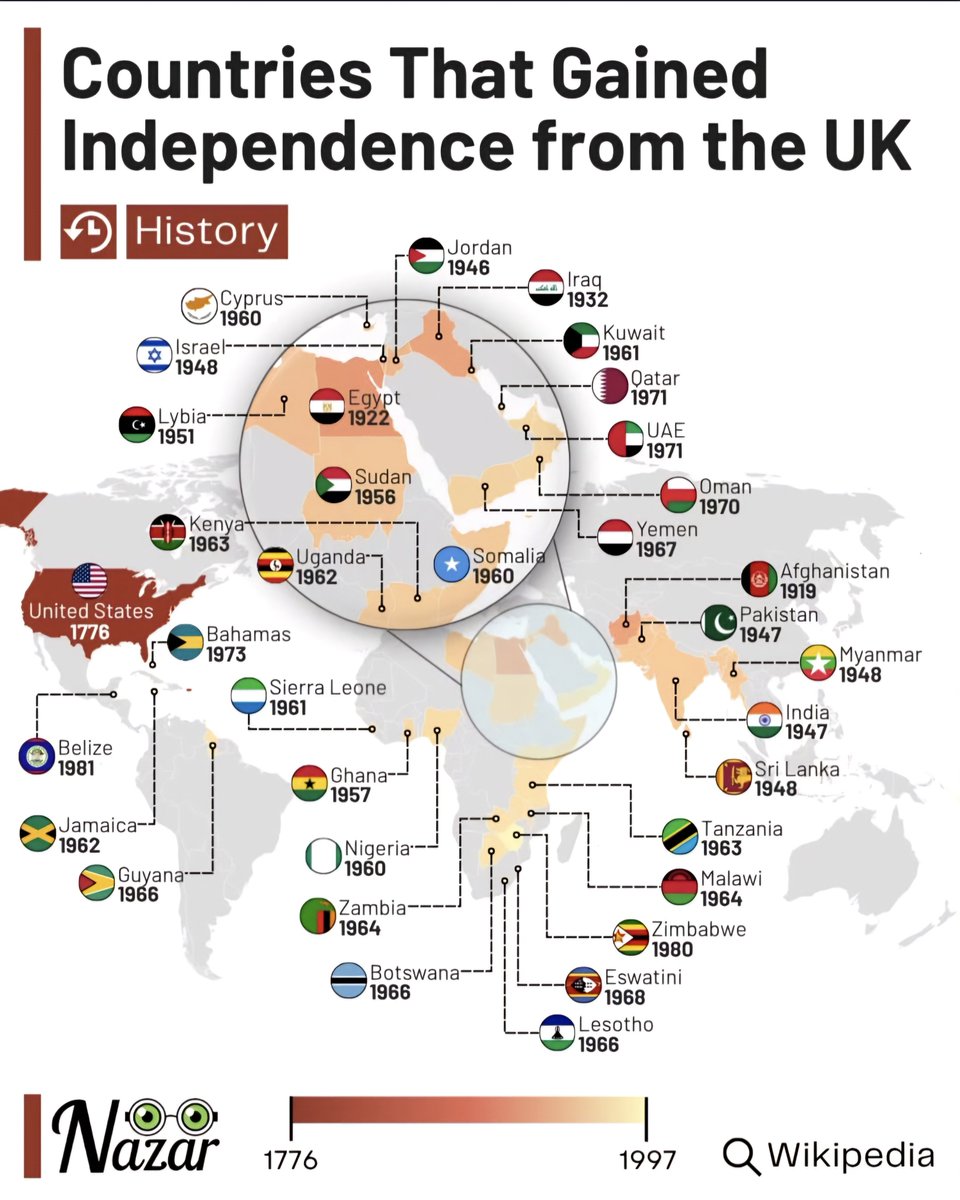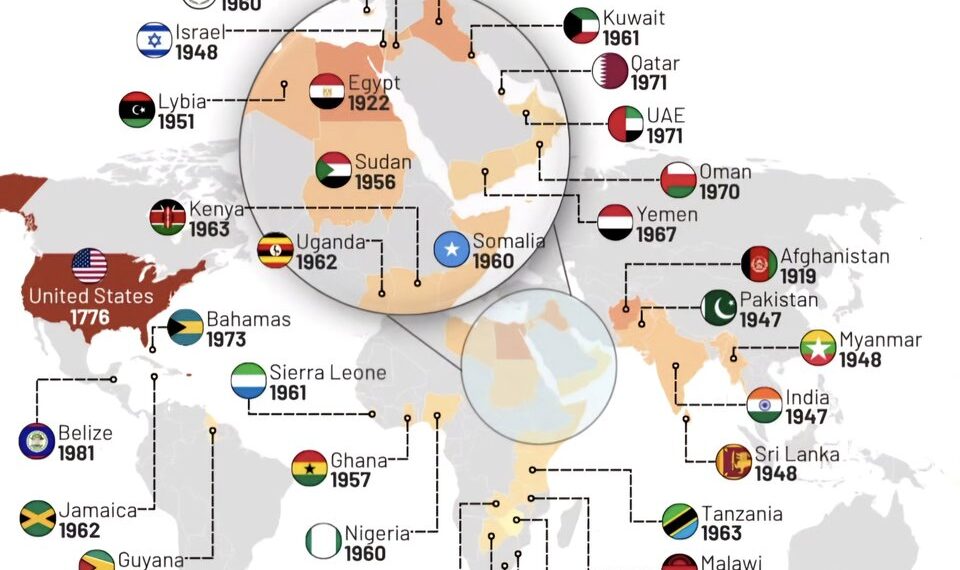Select Language:
A Look at 35 Countries That Secured Independence From the UK
Throughout history, numerous nations have fought and gained their independence from colonial rule, particularly from the British Empire. This list highlights 35 countries that successfully emerged as sovereign states after separating from British control. These nations come from diverse regions and backgrounds, each with their unique stories and struggles for freedom. Here’s an insightful breakdown of these countries and their paths to independence.

United States, 1776
The journey for independence began when the thirteen American colonies declared their freedom from British rule in 1776. This monumental event, marked by the Declaration of Independence, eventually led to the formation of the United States.
Afghanistan, 1919
Afghanistan gained its freedom from Britain after the Third Anglo-Afghan War. The Treaty of Rawalpindi recognized the country’s independence, marking a significant turning point in its history.
Egypt, 1922
Egypt’s independence emerged gradually after World War I. By 1922, Britain officially recognized Egypt’s sovereignty, though British influence persisted for decades.
Iraq, 1932
Iraq’s transition to independence occurred after World War I, culminating in a formal conclusion to British mandate control in 1932, despite ongoing foreign interference.
Jordan, 1946
The Hashemite Kingdom of Jordan gained independence from British oversight post-World War II. The 1946 National Charter marked the beginning of self-rule.
Pakistan and India, 1947
In 1947, British India was partitioned into two independent dominions: Pakistan and India. Both nations navigated turbulence as they fought for autonomy while grappling with cultural differences and communal tensions.
Israel, 1948
Following World War II and the Holocaust, Israel declared its independence in 1948. The end of British mandate facilitated the establishment of a Jewish state amidst significant geopolitical turmoil.
Myanmar, 1948
Known as Burma until 1989, Myanmar gained independence from British colonial rule in 1948. The newfound freedom was soon challenged by internal conflicts that persisted for decades.
Sri Lanka, 1948
Sri Lanka, formerly Ceylon, achieved independence concurrently with Myanmar. Despite initial optimism, the country faced challenges with ethnic conflicts in subsequent decades.
Libya, 1951
Libya secured its independence in 1951, making it one of the first African nations to emerge from colonial rule. However, the quest for stability continued through social upheaval.
Sudan, 1956
Sudan achieved independence from British-Egyptian rule in 1956. The country has since endured a complex history marked by civil conflicts and political instability.
Ghana, 1957
Ghana became the first sub-Saharan African nation to gain independence in 1957. The leadership of Kwame Nkrumah inspired a wave of decolonization across the continent.
Cyprus, Nigeria, and Somalia, 1960
In 1960, Cyprus, Nigeria, and Somalia all gained independence, marking a significant year in the decolonization process. Each nation embarked on its unique trajectory toward self-governance.
Sierra Leone and Kuwait, 1961
With independence in 1961, Sierra Leone and Kuwait both began their paths as sovereign nations, though each faced their own sets of challenges in governing and fostering national unity.
Uganda and Jamaica, 1962
Both Uganda and Jamaica declared independence in 1962. Uganda’s path shifted dramatically with upheaval in the following decades, while Jamaica became known for its vibrant culture and music.
Kenya and Tanzania, 1963
The early 1960s saw Kenya and its neighbor Tanzania gaining independence. Both countries worked toward unifying their nations while navigating the challenges of post-colonial society.
Malawi and Zambia, 1964
Malawi and Zambia achieved independence from British rule in 1964. Their struggles illustrated the broader themes of self-determination and resistance against colonial legacies in Africa.
Botswana, Lesotho, and Guyana, 1966
Independence year 1966 was significant for Botswana, Lesotho, and Guyana as they transitioned from colonial rule to self-governance.
Yemen and Eswatini, 1967-1968
Yemen’s independence followed a complex history of foreign rule, while Eswatini, formerly Swaziland, celebrated its sovereignty in 1968 amidst a traditional monarchy.
Oman, Qatar, and the United Arab Emirates, 1970-1971
The early ’70s marked the independence of Oman, Qatar, and the United Arab Emirates, reshaping the political landscape in the Gulf region.
Bahamas, Zimbabwe, and Belize, 1973-1981
The Bahamas gained independence in 1973, followed by Zimbabwe in 1980 and Belize in 1981, each paving its path while navigating post-colonial challenges.
As we reflect on these nations, we see that their journeys to independence vary widely, yet they share a common thread of resilience and the aspiration for self-determination. Each country’s story is a testament to the enduring human quest for freedom and autonomy in the face of colonialism. While this list is not comprehensive, it highlights key moments in the broader tapestry of global history, showcasing the move toward independence from British rule.






